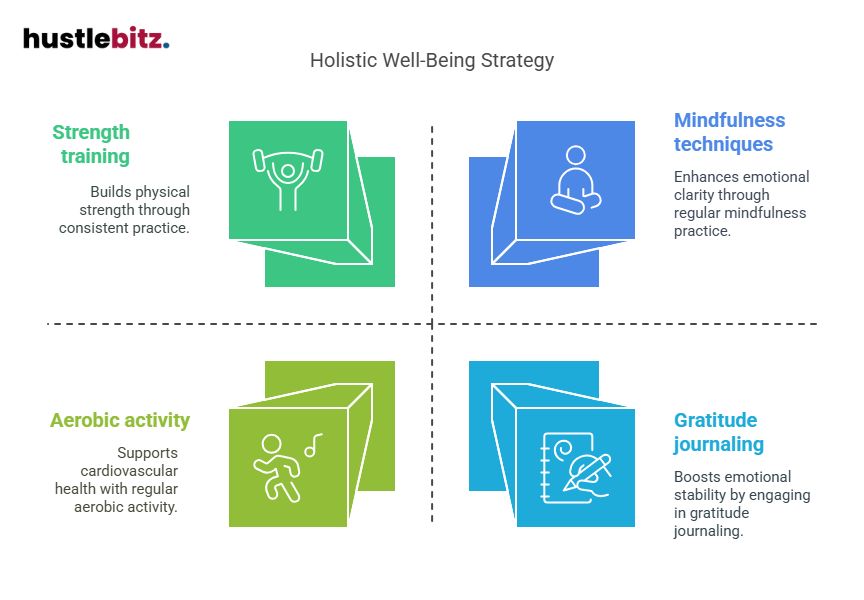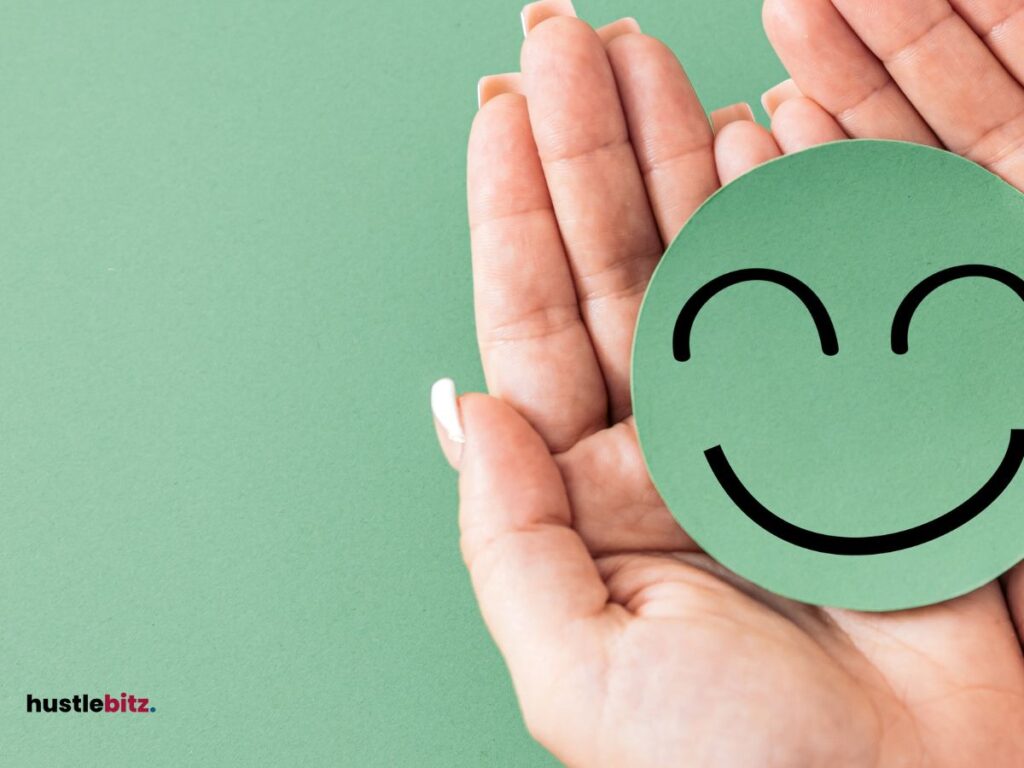The ultimate self-care checklist encompasses essential practices for physical, emotional, and mental well-being. Prioritize regular exercise, balanced nutrition, and adequate sleep to enhance physical health. Incorporating mindfulness techniques and gratitude journaling can foster emotional stability and clarity. Engaging in creative outlets or hobbies not only boosts mood but also offers therapeutic benefits. Additionally, reducing screen time through digital detox strategies strengthens social connections. Remember to stay hydrated and establish realistic goals for a fulfilling life. Explore these essentials further to unlock a comprehensive approach to enhancing your overall well-being.
Key Takeaways
- Prioritize regular exercise, aiming for 150 minutes of aerobic activity weekly and strength training twice a week for optimal physical health.
- Maintain a balanced nutrition plan with diverse food groups while minimizing processed foods to support energy and mood stability.
- Aim for 7 to 9 hours of quality sleep each night to enhance recovery, cognitive function, and emotional regulation.
- Incorporate mindfulness techniques and gratitude journaling to promote emotional awareness, mental clarity, and overall emotional stability.
- Engage in creative outlets and hobbies to foster joy, personal growth, and a balanced lifestyle, enhancing overall well-being.

Physical Health Essentials

To maintain optimal physical health, it is essential to incorporate regular exercise, balanced nutrition, and adequate sleep into your daily routine. These fundamental self-care activities significantly contribute to your overall well-being and must not be overlooked.
Regular physical activity is crucial for enhancing cardiovascular health, strengthening muscles, and improving flexibility. Aim for at least 150 minutes of moderate-intensity aerobic exercise each week, complemented by strength training exercises on two or more days. This not only boosts physical health but also promotes the release of endorphins, serving as effective coping strategies against stress and anxiety.
Balanced nutrition plays a vital role in sustaining energy levels and supporting bodily functions. Prioritize self-care by consuming a variety of whole foods, including fruits, vegetables, whole grains, lean proteins, and healthy fats. This approach helps to ensure that your body receives the necessary nutrients to function optimally, thereby enhancing your physical health and overall vitality.
Equally important is the need for adequate sleep. Aim for 7 to 9 hours of restorative sleep each night to allow your body to recover and rejuvenate. Quality sleep contributes to improved cognitive function, mood regulation, and immune support.
Emotional Well-Being Practices

Emotional well-being practices are essential for fostering resilience, enhancing self-awareness, and promoting a balanced mental state. Integrating these practices into your self-care plan allows you to address your emotional needs effectively and create a supportive environment for yourself.
To begin, it is vital to prioritize self-care by identifying activities that bring you joy. Engaging in hobbies, spending time with loved ones, or immersing yourself in nature can significantly elevate your mood and provide a sense of fulfillment. These activities not only distract from stressors but also cultivate a deeper connection with yourself and your surroundings.
Mindfulness is another powerful tool in emotional well-being. By incorporating mindfulness techniques such as meditation, deep breathing, or journaling into your daily routine, you can enhance your awareness of thoughts and emotions. This practice helps in recognizing patterns that may hinder your emotional health, allowing you to respond to challenges with greater clarity and calm.
Additionally, maintaining a gratitude journal can serve as a valuable emotional well-being practice. Regularly reflecting on what you are thankful for shifts your focus from negativity to positivity, fostering a more optimistic outlook.
Mental Health Strategies
Effective mental health strategies are crucial for maintaining overall psychological well-being and managing life’s challenges. In today’s fast-paced world, self-care is important not only for physical health but also for mental fortitude. Adopting effective mental health strategies can empower individuals to navigate stress, anxiety, and emotional turbulence with greater resilience.
First, it is essential to practice self-care regularly. This involves engaging in activities that help restore balance and promote mental clarity. Daily mindfulness exercises, such as meditation or deep breathing, can alleviate stress and enhance emotional regulation. Additionally, maintaining a consistent sleep schedule and ensuring adequate rest are vital components of mental health.
Another key aspect is social connectivity. Building and nurturing relationships can provide emotional support, reducing feelings of isolation. Engaging in group activities, whether through hobbies or community service, fosters a sense of belonging and enhances overall health and wellbeing.
Moreover, setting realistic goals can significantly impact mental health. Breaking tasks into manageable steps can minimize feelings of overwhelm and create a sense of achievement. Incorporating physical activities into your routine—such as walking, yoga, or dancing—not only benefits physical health but also releases endorphins, which are natural mood lifters.
Nutrition and Hydration

Proper nutrition and hydration play a pivotal role in overall health, influencing both physical well-being and mental clarity. When we prioritize these elements, we can significantly enhance various areas of our lives, including our energy levels, cognitive function, and emotional stability.
Nutrition and hydration act as foundational aspects of personal self-care, equipping us with the necessary tools to cultivate healthy coping mechanisms. A balanced diet rich in vitamins, minerals, and essential nutrients fosters an improved mood and better mental health.
Hydration is equally vital, as even mild dehydration can lead to fatigue, irritability, and decreased concentration. Here are some key strategies to ensure you are supporting your body effectively:
- Incorporate a variety of food groups: Ensure your meals include fruits, vegetables, whole grains, and lean proteins to meet your nutritional needs.
- Stay hydrated throughout the day: Aim for at least eight 8-ounce glasses of water, adjusting based on activity level and climate.
- Limit processed foods and sugars: Focus on whole, nutrient-dense foods to stabilize your energy and mood.
- Listen to your body’s hunger cues: Eating mindfully can help you recognize when you are hungry or full, promoting a healthier relationship with food.
Quality Sleep Habits
Quality sleep habits are essential for maintaining optimal health and enhancing overall well-being, as they directly impact cognitive function, mood regulation, and physical recovery. Establishing a reliable sleep routine is a cornerstone of any effective self-care plan. Aim for seven to nine hours of quality sleep each night, as this duration is linked to better health outcomes and lower levels of stress and anxiety.
To cultivate quality sleep habits, consider implementing a few self-care strategies that work. First, create a calming bedtime ritual that signals to your body it’s time to wind down. This may include activities such as reading, gentle stretching, or meditative practices.
Additionally, ensure your sleep environment is conducive to rest; this includes a comfortable mattress, optimal room temperature, and minimal exposure to light and noise.
Limiting screen time before bed is another crucial element in promoting quality sleep. The blue light emitted by devices can interfere with the production of melatonin, the hormone responsible for regulating sleep. Therefore, try to disconnect from electronic devices at least one hour before bedtime.
Lastly, be mindful of your food and beverage intake in the hours leading up to sleep. Avoid heavy meals, caffeine, and alcohol, as these can disrupt your sleep cycle.
Creative Outlets and Hobbies

Engaging in creative outlets and hobbies can significantly enhance mental well-being and serve as a valuable complement to the restorative benefits of quality sleep. These activities and practices not only foster a sense of accomplishment but also provide an opportunity for self-expression. When you dedicate time to pursuits that bring you joy, you create a buffer against stress and anxiety, ultimately enhancing your well-being.
Incorporating creative outlets into your routine can be especially beneficial for those juggling personal commitments. By setting aside time for hobbies, you can cultivate a balanced lifestyle that prioritizes self-care.
Consider exploring the following activities:
- Artistic Expression: Painting, drawing, or crafting can serve as a therapeutic release, allowing you to communicate emotions and thoughts visually.
- Writing: Whether journaling, composing poetry, or storytelling, writing enables reflection and personal growth, fostering clarity of mind.
- Music: Playing an instrument or engaging in singing can elevate mood and provide a sense of community, especially when shared with others.
- Physical Activities: Dance, yoga, or outdoor sports not only promote physical health but also enhance mental clarity and emotional resilience.
Digital Detox Techniques

A digital detox involves intentionally reducing or eliminating screen time to foster mental clarity, emotional well-being, and a stronger connection to the present moment. In our increasingly connected world, it is essential to prioritize self-care by incorporating effective digital detox techniques into your routine. These techniques not only alleviate stress but also enhance overall productivity and creativity.
One effective approach is to establish designated technology-free zones or times in your home. For example, consider implementing a no-device policy during meals or before bedtime. This allows for deeper connections with family and friends, while promoting healthier sleep patterns. Additionally, using apps that limit screen time can serve as valuable coping mechanisms, helping you stay accountable to your self-care plan.
Mindfulness meditation can be another powerful tool during a digital detox. Engaging in mindfulness practices encourages one to focus on the present moment, reducing the urge to reach for devices. Simple exercises, such as focusing on your breath or observing your surroundings, can help cultivate a sense of peace and clarity.
Lastly, explore alternative activities that do not involve screens, such as reading, journaling, or engaging in physical exercise. These activities can replace screen time and enhance emotional well-being.
Final Thoughts
Creating a self-care checklist that addresses your physical, emotional, and mental well-being is essential for maintaining a balanced and fulfilling life. By incorporating regular exercise, balanced nutrition, mindfulness practices, creative outlets, and digital detox strategies, you can significantly enhance your overall health. Prioritizing these essential practices ensures you have a comprehensive approach to self-care that supports your well-being. Start integrating these steps into your daily routine to cultivate a healthier, more vibrant life.




